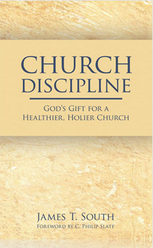
It isn't a problem for a ship to be in the ocean, since it was built for that. But when the ocean gets into the ship, there is a serious danger." - James T. South
The author is both easy and interesting to read and writes for the sake of the average congregational leader rather than the upper class of academia. The book is a pleasure to read and keeps the reader’s attention.
Strengths:
Church Discipline does an excellent job in each of the following areas:
1- Placing church discipline in its proper context of love for brethren, the church, and holiness.
2- Addressing some of the misconceptions people have regarding church discipline and answering their questions/objections.
3- Establishing the Biblical requirement and context of church discipline.
4- Giving sound biblical exegesis of difficult passages.
5- Addressing why church discipline sometimes fails.
6- Addressing pitfalls to be avoided when pursuing church discipline.
7- Stressing the neglect of teaching and administration of church discipline.
8- Defining the roles of church leaders and elders in particular in regards to church discipline.
9- Showing that there is not a single formula for all discipline situations, but that the Bible addresses how to deal with a number of potential disciplinary situations.
The author tries to give Bible passages to support all of his positions and attempts to keep texts within context while also being fair and addressing the concerns of differing positions. The writer expresses a sincere desire to see scripture take precedence and to see the holiness of the church either upheld or re-established. Love and concern are certainly the motives that drive the author and help a difficult subject to be both palatable and thought provoking.
Weaknesses:
There are three areas that the reader should be aware of while reading through this material:
1- The writer believes Matthew 18:15-20 is broader in scope than merely personal offenses. This point clouds the issues on what Matthew 18 is actually teaching, and also establishes a false precedence that the author himself does not stick to throughout. If Matthew 18:15-20 is addressing all types of sin (rather than just personal offenses), all matters of church discipline would have to be filter through the procedures there established. The writer admits that 1 Corinthians 5 and other passages are of a different sort than Matthew 18 and thus is not fully consistent throughout. Though the writer’s exegesis is off target on Matthew 18, there are many other things to consider regarding church discipline and he does a good job in those other areas.
2- The writer does a poor job of explaining that matters of liberty should be left in the realm of liberty and not be forced into church discipline issues. On page 162 the writer states, “Recognize that not all beliefs are of equal importance.” The wording of that statement could certainly be misleading and leave people with the impression that some doctrines matter and others do not, or that there are “big” sins and “little” sins. In reality, the writer is speaking of matters of liberty; it is merely poor wording of the issue.
3- The writer takes the position that congregational leaders should keep their noses in their own business and not go around warning others of divisive or heretical brethren. The writer seems to have missed the point of Paul’s repeated warnings to congregations about men such as Alexander the coppersmith; if Paul felt it necessary to warn other congregations of evil men, why should church leaders today not issue similar warnings out of concern for the church?
The three weaknesses may seem like major issues to some readers, but they represent a very small portion of the contents of the book and certainly do not outweigh the positive content. As brother Ron Courter says, “It’s all chicken and bones. Some books have more bones than chicken. Try to find books with the most meat on the bones.” There is certainly a lot of “meat” to chew on and be strengthened by in this work.
On a scale of 1 to 10 with 10 being the highest/best, I would rate this book either a 7.5 or 8.
| Church Discipline by James T. South - A Review by Nathan Battey.pdf |

 RSS Feed
RSS Feed
